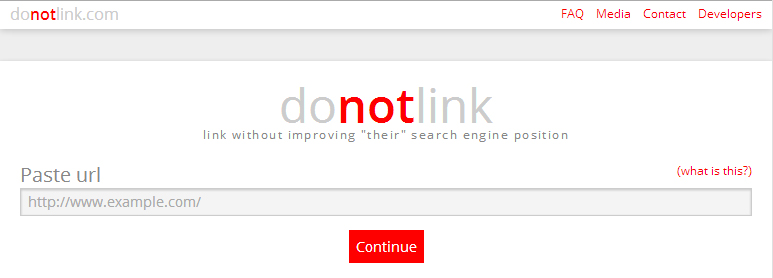
In the course of blogging about important issues, there are times when you may need to link to dubious or objectionable material in order to provide context for your post. For example, some subject matter may necessitate a reference to racist material or a fraudulent business.
Unfortunately, when it comes to SEO, the age old maxim “Any press is good press” still proves to be true. By linking to a dubious website you are involuntarily strengthening the site’s position in search engines.
If you don’t want to be complicit in promoting a site of ill-repute, there’s a service that you can use to deny these sites the SEO benefits of your link. Donotlink is a site where you can paste in links to shady websites and receive a custom URL that will not not improve their search engine rankings.
It works in a similar way to your standard url shorteners, except that it goes one step further to route questionable links through a unique intermediate URL which then forwards the visitor to the final destination via Javascript.
Donotlink employs three additional methods to prevent search engines from crawling the questionable site:
- Blocks the URL in its robots.txt file, so (search engine) robots are discouraged from crawling it
- Adds the “nofollow” attribute to the link
- If a known robot decides to crawl the link, Donotlink will identify it and serve it a blank page (403 Forbidden) instead of redirecting to the url.
Who might use donotlink? The site offers a few secenarios wherein one might consider using the service:
Skeptics, bloggers, journalists and friends on social media use donotlink to link to scams, pseudoscience, misinformation, alternative medicine, conspiracy theories, racist / sexist blog posts, etc. without improving the search engine position of the site they are discussing.
If you want to use the service but don’t want to be bothered to visit the site each time, you can structure your URL like so:
http://www.donotlink.com/www.example.com/shady/stuff.html
If you’re linking to questionable material quite often or simply want to take a principled stand against the spread of misinformation, Donotlink is an easy way to prevent your site from sending “Google juice” to the bad guys. This seems like it would be an easy WordPress plugin to create and could be useful for publications that help bring attention to shady practices.

Super tip, Sarah. Thank you very much.